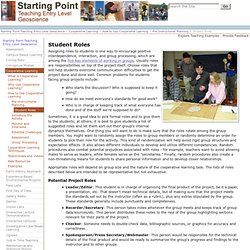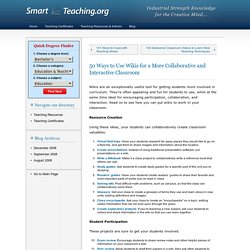

Cooperative.pdf (application/pdf Object) Scrum. Scrum Methodology & Agile Scrum Methodologies. Student Roles and Cooperative Learning. Student Roles. Assigning roles to students is one way to encourage positive interdependence, interaction, and group processing, which are among the five key elements of working in groups.

Usually roles are responsibilities on top of the project itself. Choose roles that will help students overcome communication difficulties to get the project done and done well. Common problems for students facing group projects include: Who starts the discussion? Who is supposed to keep it going? Sometimes, it is a good idea to pick formal roles and to give them to the students; at others, it is best to give students a list of suggested roles and let them sort out their group's internal dynamics themselves. Appropriate roles will depend on group size and the nature of the cooperative learning task. Potential Project Roles Leader/Editor: This student is in charge of organizing the final product of the project, be it a paper, a presentation, etc.
Possible Discussion Roles For Further Reading. 50 Ways to Use Wikis for a More Collaborative and Interactive Classroom. Wikis are an exceptionally useful tool for getting students more involved in curriculum.

They’re often appealing and fun for students to use, while at the same time ideal for encouraging participation, collaboration, and interaction. Read on to see how you can put wikis to work in your classroom. Resource Creation Using these ideas, your students can collaboratively create classroom valuables. Student Participation These projects are sure to get your students involved. Group Projects Allow wikis to facilitate group work by using these ideas. Student Interaction Get your students to work together on these projects. For the Classroom Use your wiki to create spaces that are special to your class. Community Reach out to the community with these resources that everyone can appreciate. ¿Qué es el aprendizaje colaborativo? Datos acerca de cómo crear un Proyecto Colaborativo.
Esta entrada, como no podía ser de otra manera, ha sido elaborada entre Eugenia Retamal y yo.

Igualmente la hemos publicado en nuestros respectivos Blogs. Si se te está pasando por la cabeza, la idea de favorecer el trabajo colaborativo y aún no te animas, pues aquí dejamos algunos antecedentes de nuestra experiencia, que quizá puedan ayudarte a tomar la decisión. Adelante!!!. 1º Debes por lo menos, vislumbrar los objetivos que pretender lograr, para dónde apuntas, alguna idea, de cómo ir haciéndolo, cuánta gente estará involucrada, recursos disponibles... una vez que le has dado algunas vueltas, plantea tu inquietud, en los términos lo más simple que puedas, al colega(s) con quien(es) desees emprender el desafío.
Convérsenlo, analízenlo, lleguen a acuerdos, construyan juntos y generen su programación didáctica, paso a paso. De como iban nuestras tareas, fechas previstas, problemas que habían surgido... 6º ¿Cómo hacer un vídeo de forma fácil y rápida?. Usamos el programa gratuito Skype. Aprendizaje cooperativo en 5+n pasos. ¿Estás cansada - o cansado - de ver a tus estudiantes en fila?

¿Te gustaría que tus estudiantes trabajaran en equipo pero no sabes cómo montarlo? ¿Quieres organizar tus clases cooperativamente? En esta entrada tienes las claves del Aprendizaje Cooperativo en 5+n pasos, con bastantes pistas de cómo abordarlos, posibles herramientas para ponerlos en práctica bastantes ejemplos que te ayudarán, así que, ¿por qué no te animas? Paso 1: ¿Qué sabes de Aprendizaje Cooperativo? En realidad para plantearse que tus alumnas y alumnos aprendan cooperativamente hay que ser muy valiente porque ¿qué referentes tienes tú de aprendizaje cooperativo a lo largo de tu vida como estudiante?
Así pues, con esta confianza renovada en tu apuesta por el Aprendizaje Cooperativo, la pregunta pertinente es por dónde empezar y la respuesta más profesional es que el comienzo debe ser tu propia capacitación en Aprendizaje Cooperativo. Úriz Bidegáin, N, 1999, El aprendizaje cooperativo. Paso 2: Recuerda, son personas.